英语故事-完璧归赵
- 格式:doc
- 大小:18.29 KB
- 文档页数:6
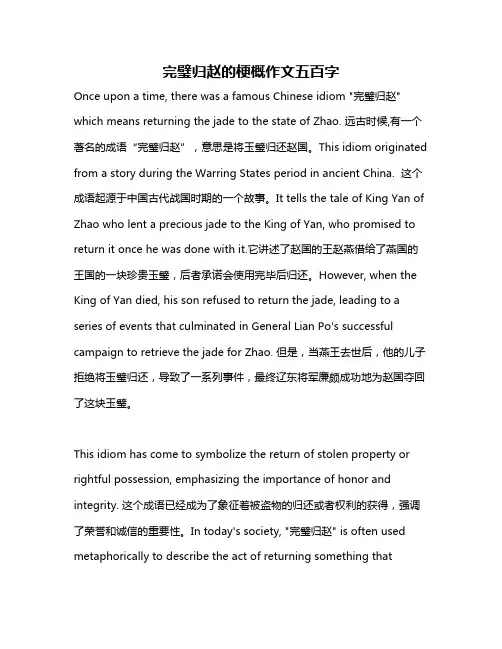
完璧归赵的梗概作文五百字Once upon a time, there was a famous Chinese idiom "完璧归赵" which means returning the jade to the state of Zhao. 远古时候,有一个著名的成语“完璧归赵”,意思是将玉璧归还赵国。
This idiom originated from a story during the Warring States period in ancient China. 这个成语起源于中国古代战国时期的一个故事。
It tells the tale of King Yan of Zhao who lent a precious jade to the King of Yan, who promised to return it once he was done with it.它讲述了赵国的王赵燕借给了燕国的王国的一块珍贵玉璧,后者承诺会使用完毕后归还。
However, when the King of Yan died, his son refused to return the jade, leading to a series of events that culminated in General Lian Po's successful campaign to retrieve the jade for Zhao. 但是,当燕王去世后,他的儿子拒绝将玉璧归还,导致了一系列事件,最终辽东将军廉颇成功地为赵国夺回了这块玉璧。
This idiom has come to symbolize the return of stolen property or rightful possession, emphasizing the importance of honor and integrity. 这个成语已经成为了象征着被盗物的归还或者权利的获得,强调了荣誉和诚信的重要性。
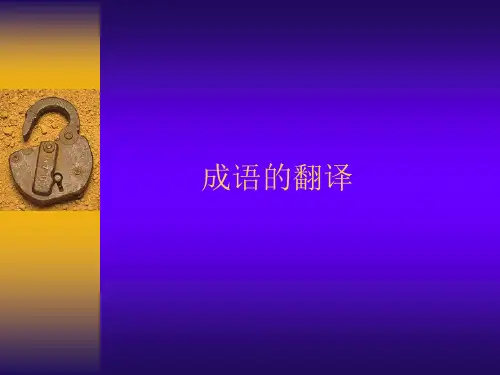

历年⾼考英语⾼难度完形填空汇编历年⾼考英语⾼难度完形填空汇编1.I was ready to pay for my bananas at the grocery one night,when fear seized me. My wallet was gone. I could only have left it on the G9 bus,which was now speeding in the dark tosome______16______station.The____17____moment was quickly followed by mental math. How much time and money would it cost to replacethe_____18_____of that little wallet?The credit cards,the driver's license,the cash,all lost to the bus.Two hours later,back at my house,I heard a knock on the door. My husband_____19_____it while I was on the phone in the dining room. "Does Jennifer live here?" I heard a lady say. In my husband's hand was my wallet,with not a penny_____20_____. She left before I could ____21____ make it to the door to offer my thanks.After sharing the story online,I heard from someone,who ____22____ the lady as Erin Smith. Without ___23___ ,I called to thank her. She said she ____24____ my wallet on a bus seat. She_____25_____that going to a stranger's house was a ____26____ move,but she decided to take the chance. "If I were in that ____27____ I would want someone to try to find me," she said.This one stranger responded beautifully to my small ____28____ ,but she actually wasn't the only one. Right after Erin____29____ my wallet on the bus,she posted a picture of my driver's license to an online forum(论坛),trying to see____30____ anyone knew me. No sooner did she leave my doorstep than I had emails from two women whose kids go to my son's nursery and who recognized my face. I've never ____31____ words with those moms beyond small tall,but they wanted to help. I read that people are more divided than ever,but that's not how the people I_____32_____tend to act.___33___,I feel blessed someone had wanted to help a stranger. Erin had gone____34____what almost anyone would have done,finding my house on a bitterly cold night,and for that I was extremely ____35____ .16. A. accessible B. hidden C. unknown D. convenient17. A. face-saving B. brain-washing C. eye-catching D. heart-stopping18. A. parts B. contents C. details D. ingredients19. A. ignored B. answered C. examined D. interrupted20. A. missing B. returned C. remaining D.abandoned21. A. still B. ever C. yet D. even22. A. selected B. appointed C. identified D. defined23. A. delay B. alarm C. regret D. invitation24. A. moved B. placed C. opened D. spotted25. A. disagreed B. complained C. calculated D. recommended26. A. selfless B. risky C. slow D. personal27. A. site B. direction C. situation D. atmosphere28. A. crisis B. danger C. threat D. failure29. A. got rid of B. made use of C. had control of D. took possession of30. A. if B. where C. how D. when31. A. recalled B. exchanged C. repeated D. whispered32. A. encounter B. follow C. consult D. accompany33. A. Going away B. Turning around C. Looking back? D. Coming along34. A. into B. against C. over D. beyond35. A. longing B. enthusiastic C. concerned D. grateful 答案及解析:1.16. C 17. D 18. B 19. B 20. A 21. D 22. C 23. A 24. D 25. C 26. B 27. C 28. A 29. D 30. A 31. B 32. A 33. C 34. D 35. D这是⼀篇夹叙夹议类的⽂章。
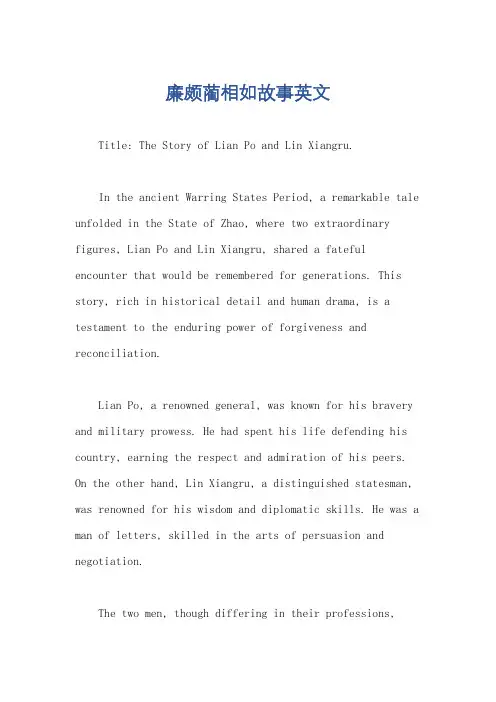
廉颇蔺相如故事英文Title: The Story of Lian Po and Lin Xiangru.In the ancient Warring States Period, a remarkable tale unfolded in the State of Zhao, where two extraordinary figures, Lian Po and Lin Xiangru, shared a fateful encounter that would be remembered for generations. This story, rich in historical detail and human drama, is a testament to the enduring power of forgiveness and reconciliation.Lian Po, a renowned general, was known for his bravery and military prowess. He had spent his life defending his country, earning the respect and admiration of his peers. On the other hand, Lin Xiangru, a distinguished statesman, was renowned for his wisdom and diplomatic skills. He was a man of letters, skilled in the arts of persuasion and negotiation.The two men, though differing in their professions,shared a common goal: the prosperity and security of their nation. However, their paths crossed in an unexpected way when Lin Xiangru rose to a position of prominence above Lian Po due to his outstanding contributions.It was said that Lin Xiangru had once recovered a valuable jade for the king, a feat that was seen as a great triumph for the nation. As a result of his bravery and intelligence, he was promoted to a position above Lian Po, sparking a sense of resentment and jealousy in thegeneral's heart.Lian Po, feeling disrespected and overshadowed, vowed to publicly disgrace Lin Xiangru. He was determined to make the statesman pay for his supposed arrogance and pride. However, Lin Xiangru, instead of retaliating, chose to avoid any direct confrontation with Lian Po. He understood that their feud was not only personal but also potentially detrimental to the welfare of the state.As months passed, Lian Po's anger grew, and he began to plot his revenge. But Lin Xiangru, with his usual calmnessand wisdom, chose to address the issue in a different way. He knew that true strength lay not in the sword, but in the heart. He decided to approach Lian Po directly and seek a peaceful resolution to their differences.In a gesture of unprecedented humility, Lin Xiangru donned a bundle of thorny branches on his back and presented himself at Lian Po's doorstep. This was a traditional symbol of apology, indicating his willingness to endure any punishment for his supposed transgressions. He requested a meeting with Lian Po, hoping to reconcile their differences and restore harmony between them.Lian Po, surprised by this unexpected act of humility and contrition, was moved deeply. He realized that Lin Xiangru's actions were not out of fear but out of a sincere desire to reconcile their differences and serve the greater interests of the state. The general's anger dissipated, and he embraced Lin Xiangru, accepting his apology andforgiving his past transgressions.From that day forward, the two men became close friendsand loyal allies. They worked side by side, collaborating on various projects that benefited the people of Zhao. Their reconciliation became a symbol of unity and cooperation, inspiring generations to emulate their example and strive for harmony in their own lives.The story of Lian Po and Lin Xiangru teaches us the important lessons of forgiveness, reconciliation, and the power of unity. It reminds us that true strength lies notin the sword or the position of power, but in the heart and the spirit of cooperation. Through their example, we are reminded that it is only through mutual respect and understanding that we can achieve true progress and prosperity.。
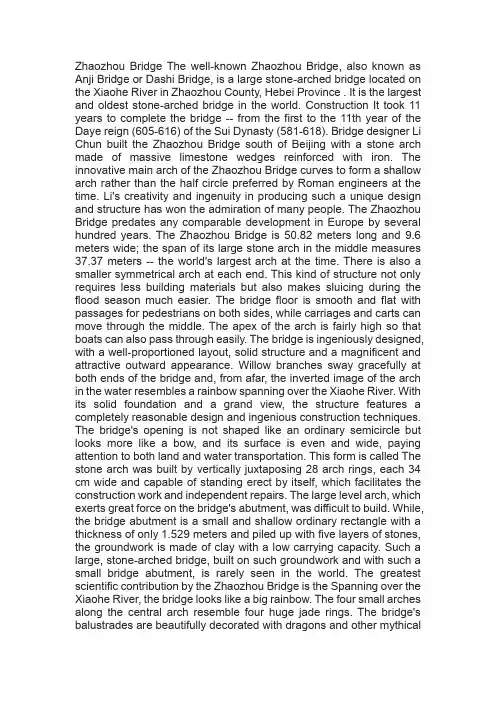
Zhaozhou Bridge The well-known Zhaozhou Bridge, also known as Anji Bridge or Dashi Bridge, is a large stone-arched bridge located on the Xiaohe River in Zhaozhou County, Hebei Province . It is the largest and oldest stone-arched bridge in the world. Construction It took 11 years to complete the bridge -- from the first to the 11th year of the Daye reign (605-616) of the Sui Dynasty (581-618). Bridge designer Li Chun built the Zhaozhou Bridge south of Beijing with a stone arch made of massive limestone wedges reinforced with iron. The innovative main arch of the Zhaozhou Bridge curves to form a shallow arch rather than the half circle preferred by Roman engineers at the time. Li's creativity and ingenuity in producing such a unique design and structure has won the admiration of many people. The Zhaozhou Bridge predates any comparable development in Europe by several hundred years. The Zhaozhou Bridge is 50.82 meters long and 9.6 meters wide; the span of its large stone arch in the middle measures 37.37 meters -- the world's largest arch at the time. There is also a smaller symmetrical arch at each end. This kind of structure not only requires less building materials but also makes sluicing during the flood season much easier. The bridge floor is smooth and flat with passages for pedestrians on both sides, while carriages and carts can move through the middle. The apex of the arch is fairly high so that boats can also pass through easily. The bridge is ingeniously designed, with a well-proportioned layout, solid structure and a magnificent and attractive outward appearance. Willow branches sway gracefully at both ends of the bridge and, from afar, the inverted image of the arch in the water resembles a rainbow spanning over the Xiaohe River. With its solid foundation and a grand view, the structure features a completely reasonable design and ingenious construction techniques. The bridge's opening is not shaped like an ordinary semicircle but looks more like a bow, and its surface is even and wide, paying attention to both land and water transportation. This form is called The stone arch was built by vertically juxtaposing 28 arch rings, each 34 cm wide and capable of standing erect by itself, which facilitates the construction work and independent repairs. The large level arch, which exerts great force on the bridge's abutment, was difficult to build. While, the bridge abutment is a small and shallow ordinary rectangle with a thickness of only 1.529 meters and piled up with five layers of stones, the groundwork is made of clay with a low carrying capacity. Such a large, stone-arched bridge, built on such groundwork and with such a small bridge abutment, is rarely seen in the world. The greatest scientific contribution by the Zhaozhou Bridge is the Spanning over the Xiaohe River, the bridge looks like a big rainbow. The four small arches along the central arch resemble four huge jade rings. The bridge's balustrades are beautifully decorated with dragons and other mythicalcreatures, which suggests that ancient people tried to shelter the structure from floods and other natural disasters. Historical significance The Zhaozhou Bridge is the oldest stone-arched bridge in China and the oldest open-spandrel bridge in the world. Its two open arches that flank the spandrel reduce the pressure on the spandrel and allow floodwater to pass. The The bridge was technologically the most advanced in the world during the Sui Dynasty. It was a remarkable achievement in the history of ancient Chinese civilization, turning over a new leaf in the annals of bridge construction history. The techniques employed on ancient Chinese bridges, especially the arched bridge represented by the Zhaozhou Bridge, have provided a foundation for the development of the modern Chinese arched bridge. The Zhaozhou Bridge is also a wonder of architectural design for its ingenuous design and beautiful decorations. However, it is even more remarkable because it has survived for centuries. With an eminent position in the history of bridge engineering, the Zhaozhou Bridge was listed by the State Council in China in 1961 as one of the key cultural sites under national protection; it was also designated by the American Society of Civil Engineers in 1991 as the 12th milestone in the history of international civil engineering, adding new glamour to China's stone-arched bridges. Legend Over the years, many beautiful folk stories about the Zhaozhou Bridge have prevailed. The following tale is the most famous: One day, during the Spring and Autumn Period (770-476BC), the skilful artisan Lu Ban of the State of Lu arrived on the banks of the Xiaohe River carrying his tools on his back. On the swift waters of the wide river he noticed two small ferryboats transporting passengers back and forth. A crowd of people waited anxiously on the banks -- some with wheelbarrows, others carrying heavy loads on their shoulders; but the ferryboat could only accommodate a small number of people. Suddenly, Lu heard someone say: According to the legend, that very evening, Lu brought back some snow-white stone blocks from the Taihang Mountains and set to work immediately. At daybreak, when the cock crowed, Lu laid the last two stone labs on the bridge. Picking up his tools, Lu went on his way again to see what else he could do for others. News spread quickly that Lu had built a stone-arched bridge overnight. Town people, as well as villagers from near and far, flocked to the site. The miracle also aroused the interest of Chai Rong, the fairy, and one of the One night, Zhang Guolao came riding a donkey with two heavy bags containing the sun and the moon hanging from its back. Then came Chai Rong pushing a wheelbarrow loaded with the five famous mountains. Arriving together at the bridge, they met Lu and asked him whether they could cross the bridge at the same time. Lu replied proudly: Since Lu, Zhang Guolao and Chai Rong did not come from the same period, they could not have possibly meteach other. It is also evident that one man could not have built such a large stone structure overnight. The myths and legends, however, are a reflection of the admiration felt by ordinary people for the bridge and the fond memory they cherish towards its builders. In spite of the harsh elements and natural disasters over more than 1,000 years, this large stone-arched bridge still stands tall to this very day.。
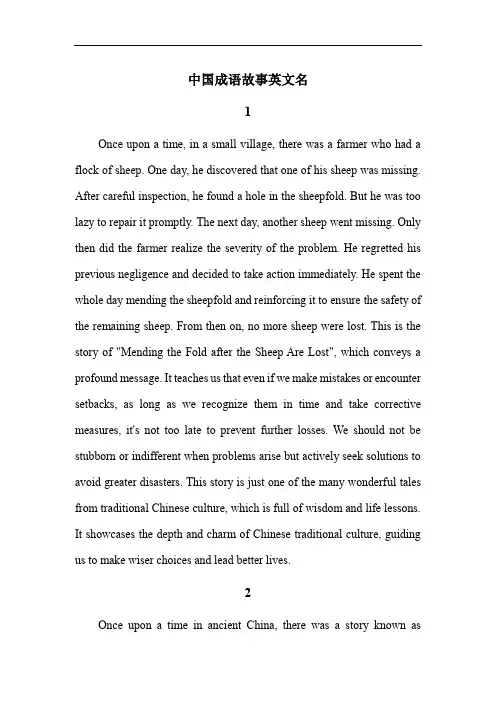
中国成语故事英文名1Once upon a time, in a small village, there was a farmer who had a flock of sheep. One day, he discovered that one of his sheep was missing. After careful inspection, he found a hole in the sheepfold. But he was too lazy to repair it promptly. The next day, another sheep went missing. Only then did the farmer realize the severity of the problem. He regretted his previous negligence and decided to take action immediately. He spent the whole day mending the sheepfold and reinforcing it to ensure the safety of the remaining sheep. From then on, no more sheep were lost. This is the story of "Mending the Fold after the Sheep Are Lost", which conveys a profound message. It teaches us that even if we make mistakes or encounter setbacks, as long as we recognize them in time and take corrective measures, it's not too late to prevent further losses. We should not be stubborn or indifferent when problems arise but actively seek solutions to avoid greater disasters. This story is just one of the many wonderful tales from traditional Chinese culture, which is full of wisdom and life lessons. It showcases the depth and charm of Chinese traditional culture, guiding us to make wiser choices and lead better lives.2Once upon a time in ancient China, there was a story known as"Carving a Mark on the Boat to Find the Sword". A man from the state of Chu was crossing a river by boat. Suddenly, his precious sword fell into the water. Without hesitation, he made a mark on the side of the boat where the sword had dropped. His companions were puzzled and asked him why he did such a thing. He calmly replied that when the boat reached the shore, he would find the sword at the marked spot. Little did he know that the boat was moving forward, but the sword would not stay in the same place. This story is a vivid illustration of how stubborn and inflexible thinking can lead to foolish actions. We should understand that circumstances change and we need to adapt our methods and thinking accordingly. We cannot rely on fixed ideas or past experiences in every situation. Just like the man in the story, if we insist on following an old pattern without considering the new conditions, we are bound to fail. This story reminds us to be flexible and open-minded, always ready to adjust our strategies to fit the changing environment. Only in this way can we avoid making similar mistakes and achieve success in our lives.3Once upon a time in ancient China, there was a story known as "The Fox Borrowing the Tiger's Ferocity". In a dense forest, there lived a powerful tiger and a cunning fox. One day, the tiger was hunting for food and came across the fox. The fox, sensing danger, quickly came up with a clever plan. The fox boldly walked in front of the tiger and boasted, "Doyou know that I am the king of all the animals? If you don't believe me, follow me and see how the other animals tremble with fear when they see me." The naive tiger followed the fox. As they walked through the forest, indeed, all the other animals fled in terror at the sight of them. The tiger thought it was because of the fox's great power, but in fact, it was the tiger's might that scared them. This story vividly shows us a phenomenon of bullying others by relying on powerful backings. Just like in our daily lives, some people use the influence or power of others to intimidate and oppress those who are weaker. However, such behavior is unjust and despicable. We should always strive to be kind, fair, and rely on our own true abilities and virtues to gain respect and success. Another famous story is "Passing Oneself Off as a Member of the Orchestra without the Skill to Play the Yu". There was a large orchestra in the kingdom, and a man named Mr. Nan Guo wanted to join it even though he had no talent for playing the yu. He managed to blend in and pretend to play along. But when the king asked for a solo performance, his deception was exposed. This tale reminds us that it is impossible to succeed by cheating or pretending. We must have genuine skills and efforts to achieve our goals and make real progress in life.4Once upon a time in ancient China, there were many interesting and enlightening idiom stories that reflected the wisdom of our ancestors. Letme tell you two of them.One is the story of "Waiting for Rabbits by the Tree Stump". There was a farmer who, by chance, found a rabbit that had knocked itself unconscious against a tree stump. Instead of continuing his hard work in the fields, he decided to just wait by the stump, hoping for more rabbits to come. Day after day passed, but no more rabbits appeared. In the end, he gained nothing. This story teaches us that relying on luck and being lazy will lead to failure. We should work hard and be proactive to achieve our goals.Another story is "Pulling Up Seedlings to Help Them Grow". A farmer was so eager for his seedlings to grow taller that he pulled them up one by one. Unfortunately, all the seedlings died as a result. This tale warns us that we should not be impatient and violate the natural laws in our pursuit of success. We need to have patience and let things develop naturally.These idiom stories, although simple, carry profound wisdom. They remind us to be diligent, patient, and respect the rules of nature and life. They are like precious treasures passed down from our ancestors, guiding us on the right path in life.5Once upon a time in ancient China, there was a fascinating story known as "Contradicting Oneself". A man was selling spears and shieldsin the market. He boasted loudly that his spears were so sharp that they could pierce through any shield. And at the same time, he claimed that his shields were so strong that they could withstand any spear. People around him were confused and questioned the logic of his claims. How could his spears be able to pierce all shields and his shields be able to defend against all spears at the same time? This story vividly shows the absurdity of self-contradiction and reminds us to be rational and consistent in our words and actions.Another well-known story is "Lord Ye's Love of Dragons". Lord Ye professed to love dragons with all his heart. He decorated his house with dragon patterns everywhere. But when a real dragon came to visit him, he was so frightened that he ran away in terror. This story teaches us that true love and appreciation should not just be on the surface but should come from the depth of our hearts.These Chinese idiom stories are not only interesting but also carry profound wisdom and cultural heritage. They allow us to understand the complexity and depth of the Chinese language and culture. Through these stories, we can gain insights into human nature, morality, and the importance of being sincere and consistent.。
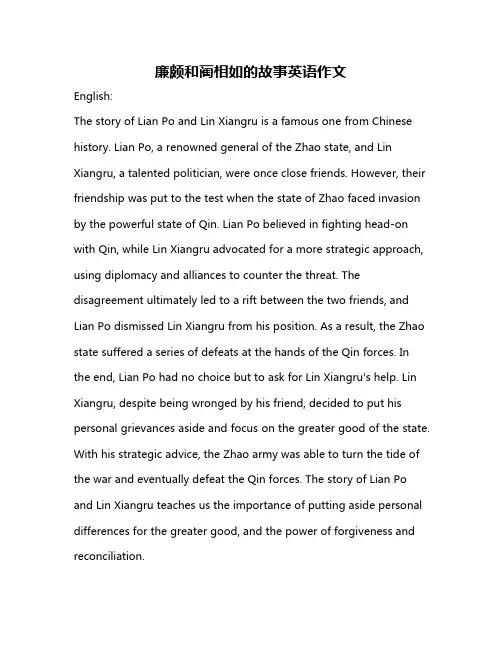
廉颇和蔺相如的故事英语作文English:The story of Lian Po and Lin Xiangru is a famous one from Chinese history. Lian Po, a renowned general of the Zhao state, and Lin Xiangru, a talented politician, were once close friends. However, their friendship was put to the test when the state of Zhao faced invasion by the powerful state of Qin. Lian Po believed in fighting head-on with Qin, while Lin Xiangru advocated for a more strategic approach, using diplomacy and alliances to counter the threat. The disagreement ultimately led to a rift between the two friends, and Lian Po dismissed Lin Xiangru from his position. As a result, the Zhao state suffered a series of defeats at the hands of the Qin forces. In the end, Lian Po had no choice but to ask for Lin Xiangru's help. Lin Xiangru, despite being wronged by his friend, decided to put his personal grievances aside and focus on the greater good of the state. With his strategic advice, the Zhao army was able to turn the tide of the war and eventually defeat the Qin forces. The story of Lian Po and Lin Xiangru teaches us the importance of putting aside personal differences for the greater good, and the power of forgiveness and reconciliation.中文翻译:廉颇和蔺相如的故事是中国历史上著名的故事。
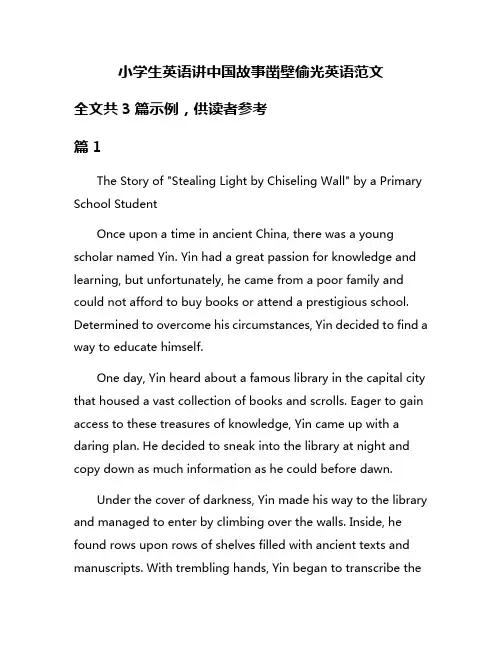
小学生英语讲中国故事凿壁偷光英语范文全文共3篇示例,供读者参考篇1The Story of "Stealing Light by Chiseling Wall" by a Primary School StudentOnce upon a time in ancient China, there was a young scholar named Yin. Yin had a great passion for knowledge and learning, but unfortunately, he came from a poor family and could not afford to buy books or attend a prestigious school. Determined to overcome his circumstances, Yin decided to find a way to educate himself.One day, Yin heard about a famous library in the capital city that housed a vast collection of books and scrolls. Eager to gain access to these treasures of knowledge, Yin came up with a daring plan. He decided to sneak into the library at night and copy down as much information as he could before dawn.Under the cover of darkness, Yin made his way to the library and managed to enter by climbing over the walls. Inside, he found rows upon rows of shelves filled with ancient texts and manuscripts. With trembling hands, Yin began to transcribe thewords onto pieces of parchment, using a small lantern to illuminate the pages.Hours passed, and Yin worked tirelessly, copying down as much information as he could. Just as the first light of dawn began to creep into the library, Yin heard footsteps approaching. Panicked, he quickly extinguished the lantern and hid behind a bookshelf, praying that he would not be discovered.To his surprise, the person who had entered the library was not a guard or a scholar, but an old monk. The monk approached Yin and asked him why he was there. Trembling, Yin confessed his desperate situation and his burning desire to learn.Moved by Yin's sincerity and determination, the monk decided to help him. He offered to become Yin's mentor and teach him everything he knew about literature, philosophy, and the arts. Over the following years, Yin studied under the monk's guidance and became a renowned scholar in his own right.The story of Yin's daring act of "stealing light by chiseling wall" became a legend that inspired generations of students to pursue knowledge and learning with passion and determination. It is a reminder that no matter how challenging our circumstances may be, the thirst for knowledge can illuminate even the darkest paths and lead us to greatness.And so, the brave young scholar Yin became a shining example of the power of education and the enduring legacy of a single act of courage and determination.篇2Once upon a time, in ancient China, there was a young boy named Zhang Liang who lived in the village of Yunmeng. Zhang Liang was a smart and talented boy, but his family was poor and could not afford to send him to school. Despite this, Zhang Liang was determined to learn and educate himself.One day, Zhang Liang heard about a famous scholar, Huang Shi Gong, who lived in a nearby village. He decided to visit Huang Shi Gong and ask him to become his teacher. When he arrived at Huang Shi Gong's house, he found the scholar reading a book by the dim light of a candle.Zhang Liang told Huang Shi Gong about his desire to learn and asked him to take him as his student. However, Huang Shi Gong was hesitant, as he knew that Zhang Liang's family could not pay for his tuition. But Zhang Liang was persistent and promised to work hard and learn everything he could.Impressed by Zhang Liang's determination, Huang Shi Gong agreed to take him as his student. However, Huang Shi Gong hadone condition – Zhang Liang must read and memorize the entire book that he was reading by the light of the candle. The book was written in ancient Chinese characters and was very difficult to understand.Undeterred, Zhang Liang accepted the challenge and spent hours each day reading and memorizing the book. He would sneak into Huang Shi Gong's house at night and read the book by the light of the candle that was left burning on the table. Despite the hardships and challenges, Zhang Liang persevered and eventually learned the entire book.One day, Huang Shi Gong was astonished to find Zhang Liang reciting the entire book from memory. He was impressed by Zhang Liang's dedication and hard work and agreed to teach him further. Under Huang Shi Gong's guidance, Zhang Liang excelled in his studies and became a renowned scholar in his own right.The story of Zhang Liang's perseverance and determination to learn has been passed down through generations in China. It serves as a reminder that with hard work and dedication, anything is possible. Zhang Liang's story also teaches us the importance of seeking knowledge and never giving up on our dreams.In conclusion, the story of Zhang Liang and Huang Shi Gong is a testament to the power of education and the importance of perseverance. It reminds us that true knowledge comes from within and that with determination, even the poorest of children can achieve greatness. Let us all be inspired by Zhang Liang's story and never stop learning and growing.篇3The Story of "Stealing Light by Chiseling the Wall"Once upon a time, in ancient China, there was a young student named Mozi who lived in the State of Song. Mozi was a diligent learner and had a great passion for knowledge. However, his family was poor, and they could not afford to buy books for him to study. Despite this, Mozi was determined to educate himself and was constantly seeking ways to learn more.One day, Mozi heard about a renowned scholar who lived in the neighboring State of Qi. This scholar had a vast collection of books and knowledge, and Mozi knew that he could learn a lot from him. However, the scholar was not willing to share his knowledge with anyone who could not afford to pay for it.Undeterred, Mozi decided to find a way to gain access to the scholar's library. He remembered a story he had heard about theancient philosopher Confucius, who had once said, "If the light does not come to you, go to the light." Inspired by this wisdom, Mozi came up with a plan to "steal light by chiseling the wall."Mozi went to the scholar's house and offered to work for him as a servant. The scholar, impressed by Mozi's determination and work ethic, agreed to hire him. Mozi worked hard every day, doing chores around the scholar's house and earning his trust.One night, when everyone else was asleep, Mozi took a chisel and quietly made a small hole in the wall of the scholar's library. Through this hole, he could see the books on the shelves and read the words printed on the pages. Mozi spent hours every night studying and memorizing the knowledge contained in those books.Over time, Mozi's knowledge and wisdom grew, and he became known as a great scholar himself. The scholar, impressed by Mozi's intelligence and dedication, eventually allowed him to borrow his books and learn from them openly.From then on, Mozi continued to study and learn, becoming one of the most respected scholars in ancient China. His story of "stealing light by chiseling the wall" became a legend, inspiring generations of students to pursue knowledge and wisdom with determination and perseverance.In conclusion, the story of Mozi teaches us the importance of education and the power of determination. No matter what challenges we face, we should never give up on our quest for knowledge and enlightenment. By following in Mozi's footsteps and "stealing light by chiseling the wall," we can reach new heights of learning and understanding in our own lives.。
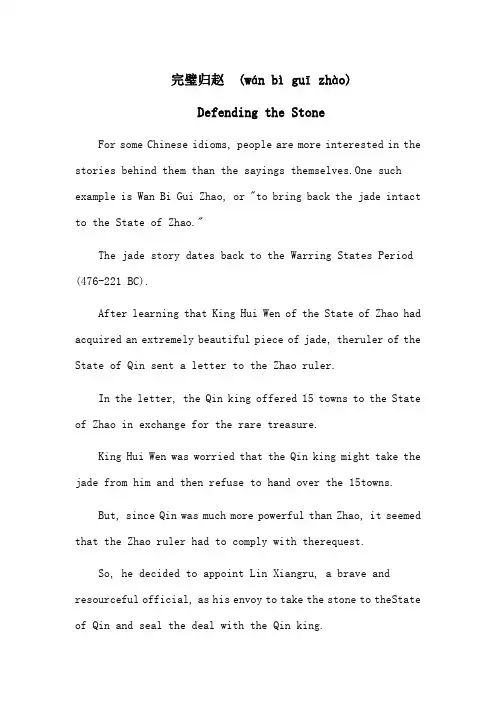
完璧归赵(wán bì guī zhào)Defending the StoneFor some Chinese idioms, people are more interested in the stories behind them than the sayings themselves.One such example is Wan Bi Gui Zhao, or "to bring back the jade intact to the State of Zhao."The jade story dates back to the Warring States Period (476-221 BC).After learning that King Hui Wen of the State of Zhao had acquired an extremely beautiful piece of jade, theruler of the State of Qin sent a letter to the Zhao ruler.In the letter, the Qin king offered 15 towns to the State of Zhao in exchange for the rare treasure.King Hui Wen was worried that the Qin king might take the jade from him and then refuse to hand over the 15towns.But, since Qin was much more powerful than Zhao, it seemed that the Zhao ruler had to comply with therequest.So, he decided to appoint Lin Xiangru, a brave and resourceful official, as his envoy to take the stone to theState of Qin and seal the deal with the Qin king.Before his departure, Lin told the Zhao king that he would bring back the jade intact if the Qin ruler broke hisword.After receiving the stone, the Qin ruler was so pleased. He held it in his hands and showed it to his aides. Itseemed that he had no intention to talk about the 15 towns he had promised in exchange for the jade.Seeing this, the Zhao envoy told the Qin king that the jade had an almost indiscernible flaw and he would liketo show it to him.But when the stone was in his hand, the envoy retreated a few steps toward a granite column, threatening tobreak both the jade and his own head against the column if the king forced him to relinquish the stonewithout giving Zhao the promised towns.The Qin king did not want to see the treasure destroyed like that, so he agreed to the Zhao envoy's demand,saying he would hold a grand ceremony the next day for the exchange of the stone.That night, the envoy sneaked out of the State of Qin and returned the jade intact to the State of Zhao as hehad promised.Today, people are still impressed by the courage and aptitude of the Zhao envoy in the story.And they tend to quote the saying Wan Bi Gui Zhao to describe something being returned to its owner intact.。
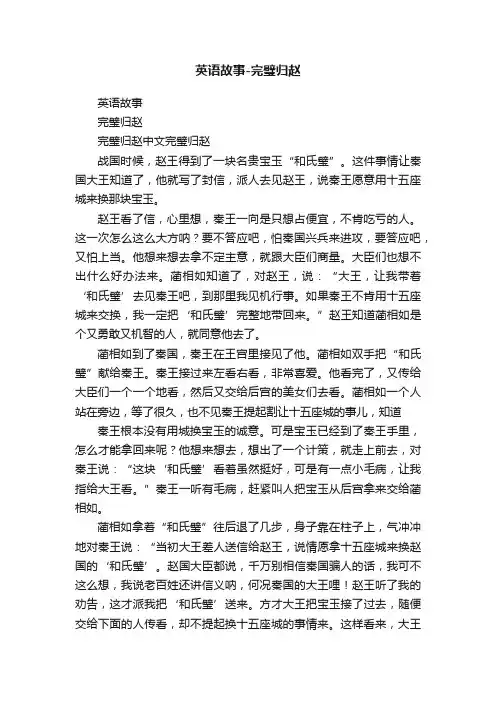
英语故事-完璧归赵英语故事完璧归赵完璧归赵中文完璧归赵战国时候,赵王得到了一块名贵宝玉“和氏璧”。
这件事情让秦国大王知道了,他就写了封信,派人去见赵王,说秦王愿意用十五座城来换那块宝玉。
赵王看了信,心里想,秦王一向是只想占便宜,不肯吃亏的人。
这一次怎么这么大方呐?要不答应吧,怕秦国兴兵来进攻,要答应吧,又怕上当。
他想来想去拿不定主意,就跟大臣们商量。
大臣们也想不出什么好办法来。
蔺相如知道了,对赵王,说:“大王,让我带着‘和氏璧’去见秦王吧,到那里我见机行事。
如果秦王不肯用十五座城来交换,我一定把‘和氏璧’完整地带回来。
”赵王知道蔺相如是个又勇敢又机智的人,就同意他去了。
蔺相如到了秦国,秦王在王宫里接见了他。
蔺相如双手把“和氏璧”献给秦王。
秦王接过来左看右看,非常喜爱。
他看完了,又传给大臣们一个一个地看,然后又交给后宫的美女们去看。
蔺相如一个人站在旁边,等了很久,也不见秦王提起割让十五座城的事儿,知道秦王根本没有用城换宝玉的诚意。
可是宝玉已经到了秦王手里,怎么才能拿回来呢?他想来想去,想出了一个计策,就走上前去,对秦王说:“这块‘和氏璧’看着虽然挺好,可是有一点小毛病,让我指给大王看。
”秦王一听有毛病,赶紧叫人把宝玉从后宫拿来交给蔺相如。
蔺相如拿着“和氏璧”往后退了几步,身子靠在柱子上,气冲冲地对秦王说:“当初大王差人送信给赵王,说情愿拿十五座城来换赵国的‘和氏璧’。
赵国大臣都说,千万别相信秦国骗人的话,我可不这么想,我说老百姓还讲信义呐,何况秦国的大王哩!赵王听了我的劝告,这才派我把‘和氏璧’送来。
方才大王把宝玉接了过去,随便交给下面的人传看,却不提起换十五座城的事情来。
这样看来,大王确实没有用城换璧的真心。
现在宝玉在我的手里。
如果大王硬要逼迫我,我情愿把自己的脑袋跟这块宝玉一块儿碰碎在这根柱子上!”说着,蔺相如举起“和氏璧”,对着柱子,就要摔过去。
秦王本来想叫武士去抢,可是又怕蔺相如真的把宝玉摔碎,连忙向蔺相如赔不是,说:“大夫不要着急,我说的话怎么能不算数哩!”说着叫人把地图拿来,假惺惺地指着地图说:“从这儿到那儿,一共十五座城,都划给赵国。
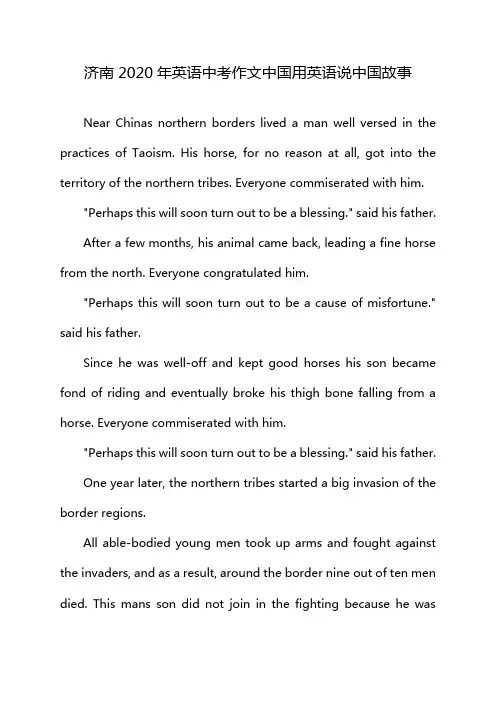
济南2020年英语中考作文中国用英语说中国故事Near Chinas northern borders lived a man well versed in the practices of Taoism. His horse, for no reason at all, got into the territory of the northern tribes. Everyone commiserated with him."Perhaps this will soon turn out to be a blessing." said his father.After a few months, his animal came back, leading a fine horse from the north. Everyone congratulated him."Perhaps this will soon turn out to be a cause of misfortune." said his father.Since he was well-off and kept good horses his son became fond of riding and eventually broke his thigh bone falling from a horse. Everyone commiserated with him."Perhaps this will soon turn out to be a blessing." said his father.One year later, the northern tribes started a big invasion of the border regions.All able-bodied young men took up arms and fought against the invaders, and as a result, around the border nine out of ten men died. This mans son did not join in the fighting because he wascrippled and so both the boy and his father survived.。
英语故事
破镜重圆
破镜重圆中文破镜重圆
南朝的陈国将要灭亡的时候,驸马徐德言把一面铜镜破开,跟妻子各留下一半。
双方约定:如果将来夫妻失散了,就把它当作信物。
后来,夫妻二人真的失散了,凭借着各人留下的半面镜子,他们最终又得到团圆。
“破镜重圆”这个成语比喻夫妻失散或分离后重新团聚。
破镜重圆英文A Broken Mirror Made Whole Again
In the Northern and Southern Dynasties (nán běi cháo 南北朝,420-589AD) when the State of Chen (chén guó陈国) was facing its demise, Xu Deyan (xú dé yán 徐德言), husband of the princess, broke a bronze mirror into halves. Each of them kept a half as tokens in case they were separated. Soon afterwards, they did lose touch with each other, but the two halves of the mirror enabled them to be reunited.
This idiom is used to refer to the reunion of a couple after they lose touch or break up.。
戏说考研完形填空:完璧归赵如影随形最近在看一些老电影,其中最喜欢《Forrest Gump》中的一个桥段,儿时的阿甘和珍妮被一群坏孩子欺负。
他们骑着自行车去追阿甘。
当时阿甘腿是有残疾的,要用器械辅助才能走路。
其中印象最深的一句话就是珍妮不停地对阿甘喊“Run,Forrest Gump…Run,Forrest Gump…”阿甘不停地奔跑,最终奇迹发生——这句话我也想送给大家“run,comrades-in-arms.”"life was like a box of chocolates, you never know what you`re gonna get"——人生就像一盒巧克力,你永远不会知道下一颗是什么。
人生充满了未知,You are the artist that paints your future with the brush of today重剑无锋,大巧不工完形填空是从中考、高考、四六级一起陪我们走过来的一个题型,也会继续陪伴我们考研、考博等一系列的考试,是我们所公认“老大难”的一个题型。
完形填空,顾名思义就是通过填空,让一篇不完整的文章恢复原来的模样,即考察我们的障碍式阅读。
更深一步来讲,这是由“已知”探索“未知”的一个过程,这也是任何一门科学、一门学问都要重视的一个技能。
我们听过无数老师这样讲,完形填空呀,分四步“读首句,把握大意”“根据上下文语境,初选答案”“复读文章,查漏补缺”“通读全文,复查答案”但我们把这些话奉为金牌法则之后,做题的时候还是靠虚无缥缈的语感来做题。
试问,上下文的要点关键是什么?语境背后的内涵又是什么?知道答案之后来讲完形,就像知道真相后来破案,只要把正确答案讲通就行了。
金翅从小到大上过各种的英语辅导班,讲完形的老师基本都是一个套路,先把正确的选项带入原文,然后把原文翻译一遍。
但是隐藏在表面背后的原理我们却一直没有触及到,这就导致了“开始的开始我们凭语感做题,最后的最后我们靠运气得分”的困境,面对完形我们究竟该何去何从?做题策略篇哲学中讲过,有运动的地方就有方法论,本文旨在提出一个观点,一个理论,把虚无缥缈的形式化、模式化、定量化的表达出来。
适合小学生的英语成语故事Cao Shang Acquires ChariotsThere was a man named Cao Shang in the State of Song.宋国有个人,名叫曹商。
Once, he was sent on a mission by the King of Song to the State of Qin. Before departure, the King of Song bestowed upon him several horse-drawn chariots. Upon arriving in the State of Qin, Cao Shang won the favour of the King of Qin. Consequently, the King bestowed upon him 100 chariots.一次,他受宋王的派遣,出使秦国。
临行时,宋王赐给他几乘车马。
到了秦国,曹商很得秦王欢心,于是秦王又赐给他百乘车马。
Soon afterwards, Cao Shang returned to the State of Song. One day he met Zhuang Zi and said proudly:不久,曹商返回宋国。
一天,他见到庄子,得意洋洋地说:"In the past, I lived in poor streets and humble alleys. I was very poor, and made my living by making shoes. I was sallow and thin. This was my weak point. Now, relying on my clever tongue, I have touched the heart of the Kingof Qin, who is the sovereign lord with 1,000 chariots. He bestowed upon me 100 chariots. This is my strong point."“过去我身居穷街陋巷,非常贫困,靠编鞋过日子,面黄肌瘦,这是我的短处。
G2成语_The Unlikely Friendship 负荆请罪专辑:Tales of China 英文讲最美中国故事G2成语_The Unlikely Friendship 负荆请罪作者:Evan Peng朗读者:Aaron SmithLexile:600L难度:相当于美国小学二年级战国时期,赵国有两位官员,一个叫蔺相如,另一个叫廉颇。
廉颇是武将,他保家卫国,蔺相如是文官,很有辩才。
蔺相如因为“完璧归赵”有功而被封为上卿,位在廉颇之上。
廉颇很不服气,扬言要当面羞辱蔺相如。
蔺相如得知后,尽量回避、容让,不与廉颇发生冲突。
蔺相如的门客以为他畏惧廉颇,蔺相如将作何反应呢?Welcome to ALO7's Power to Learn! Today's story is The Unlikely Friendship, retold by Evan Peng and narrated by Aaron Smith.During the Warring States Period, the two highest officials of the Zhao Kingdom were Lian Po and Lin Xiangru.Lian Po was the head of the army. He was in charge of all the soldiers. He made sure the Kingdom of Zhao was safe. He was strong and proud. People knew he was wise at military strategy.Lin Xiangru was the chief minister. He was not like a soldier at all. Instead, he worked in the government. He made sure that it worked well. He was smart and a great speaker.Lin Xiangru had quickly become powerful in the government. The king of Zhao liked him very much. He trusted him. Lin Xiangru had once saved the king from embarrassment.However, Lin Xiangru’s quick rise made many others jeal ous. Even Lian Po. Why? Well, Lin Xiangru was in charge of even Lian Po.Lian Po told his soldiers, “I had to risk my life in many battles to get where I am. But then this guy, Lin Xiangru, he gets to the top by doing nothing! All he did was talk!” Lian Po was so angry that he thought of a plan to embarrass Lin Xiangru.Word of Lian Po’s plan made its way to Lin Xiangru. He didn’t want to meet Lian Po. He stopped going out. He even faked being sick for a while, so he could have an excuse to stay inside.One day, Lin Xiangru could not stay inside. He went out in his carriage. Soon, he saw Lian Po’s carriage coming toward him. He told his driver to quickly turn around. Lin Xiangru went back home. When the government ministers heard about it, they mocked him. They said he should be embarrassed. They said he was a coward.But Lin Xiangru responded calmly. He said, “Do you want to know why I do not want to meet Lian Po? The conflict between us is personal. As thechief minister, I make sure that the government works correctly. As the head of the army, Lian Po makes sure that we stay safe. Together, we keep the kingdom running smoothly. So, if other kingdoms learn of our conflict, they might think that our government is weak. Then they might attack and destroy us. So, you see, I cannot let a personal matter destroy the kingdom!”The ministers were inspired by Lin Xiangru's words. Lian Po heard about what Lin Xiangru had said. His jealousy turned to regret. He asked Ling Xiangru for forgiveness. The two leaders became good friends. Due to their strong relationship, the State of Zhao remained peaceful for many years.The EndQuestion: How quickly do you forgive others?核心词汇in charge of 主管,负责; 照料military strategy 军事战略embarrassment n. 难堪; 窘迫; 令人难堪或耻辱的事jealous adj. 妒忌的; 吃醋的; 羡慕的battle n. 战役,战斗,会战fake v. 伪装,假装mock v. 愚弄,嘲弄; 使受挫折; 不尊重,蔑视coward n. 胆小鬼,懦夫respond v. 作答,回答run v. 运转smoothly adv. 顺利地; 平稳地; 平滑地; 流畅地inspire v. 激励; 鼓舞; 启迪; 赋予灵感regret v. 悼念,哀悼; 感到后悔,感到抱歉forgiveness n. 宽恕; 原谅due to 由于; 因为; 欠下债[账],应给予; 应归于阅读量 (6)。
蔺相如,赵国人,生卒年不详,为战国时期赵国上卿。
蔺相如原本为赵国宦官头目缪贤家的一名舍人。
惠文王时,得楚“和氏璧”,秦昭王闻悉,遗书赵王,愿以15城易璧。
蔺相如在这危难关出使秦国。
秦王接见赵使,接玉后又无意偿城,蔺相如智索国宝,严辞揭穿骗局。
秦人欲以武力夺回璧玉,蔺相如“怒发冲冠”,“举璧睨柱”,表示与国宝共存亡的决心,取得了如“完璧归赵”的胜利。
前279年(赵惠文王二十年),秦、赵“渑池会”,蔺相如自报奉陪赵王赴会,他以机敏和雄辩,阻止了秦的欺侮和胁迫。
廉颇是赵之良将,拜为上卿。
蔺相如因外交斗争的功大也拜为上卿,且位居廉颇之上。
廉颇欲侮辱之。
针对廉颇的挑战,蔺相如每遇上朝,常称病不去,不与廉颇争位次,道遇廉颇,多引车避匿。
他曾向门人表白心迹:“强秦之所以不敢加兵于赵者,徒以吾两人在也。
今两虎相斗,其势不俱生,吾所以为此者,先国家之急而后私仇也。
”由于他善自谦抑,相忍为国,使廉颇悔恨交加,负荆请罪,遂成刎颈之交。
赵孝成王继位,以赵括取代廉颇,蔺相如带病劝说赵王:“王以名使括,若胶柱而鼓瑟耳。
括徒能读其父书传,不知合变也。
”赵王不听,终于导致了长平惨败。
廉颇,生卒年不详,战国时期赵国杰出的军事将领。
主要活动在赵惠文王(前298—前266)、赵孝成王(前266—前245)、赵悼襄王(前245—前236年)时期。
赵惠文王初,东方六国以齐最为强盛,齐与秦各为东西方强国。
秦围欲东出扩大势力,赵国当其冲要。
为扫除障碍,秦王曾多次派兵进攻赵国。
廉颇统领赵军屡败秦军,迫使秦改变策略,实行合纵,于惠文王五十四年(前258年)在中阳(今山西中阳县西)与赵相会讲和。
以联合韩、燕、魏、赵五国之师共同讨伐齐国,大败齐军。
其中,廉颇于惠文王十六年(前283年)带赵军伐齐,长驱深入齐境,攻取阳晋(今山东郸城县西,本为卫国领地,后属齐),威旗诸侯,而赵国也随之越居六国之首。
廉颇班师回朝,拜为上卿(上卿为当时最高级的文官,相当于后来的宰相),秦国虎视赵国而不放贸然进攻,正是慑于廉颇的威力。
10 篇英语作文 100 词【篇一:高中英语作文十篇范文】书面表达简汇1.[ 安徽省皖南八校 2014 届高三第三次联考 ]近来 ,某英文杂志社举办征文活动 ,请你联合下边这幅图的内容写一篇短文进行投稿 .内容应包含 :1.描绘图画内容 ;2.揭露图画所反应的社会问题 ;3.说说你的见解注意 :词数 120 左右 ,开头已给出 ,不计入总词数 . rainpouring, an old lady falls down. a passer-by is overwhether to support her with his hand or not.完整倒装句型behindthismessage they probably fear that they are wrongly accused of knocking them down and even pay compensation.倒装的虚构条件句. respecting the old is our chinese traditional virtue. not onlycan we bring out the best of . moreover, if we are unwilling tohelp those in trouble, we might be ignored in time ofemergency.2.【蚌埠二中 2015 届高三 12 月月考】当前,好多中学生热中于读网络小说而对中国的传统诗歌不予重视。
若是你是高中生李华,请依据以下提示,给某英语报社写封信,表达你的见解。
1.热中于网络小说的原由;2.不喜爱中国传统诗词的原由;3.你的建议。
dear editor,today, many teenagers especially reading internet novels. asa result, they are always being poisoned by the unhealthycontents of the novels, such as sex, violence or murder.however, they show little interest in classic chinese poems.they believe that these poems are of little or no value to their 1/ 5they learn them just because they have to pass exams.in fact, reading these poems can not only encourage readers’these benefits are all of great importance to their learning andlife. so i think teenagers should learn and recite classicchinese poems.i am looking forward to hearing your opinion on this.3.【安徽宣城八校】此刻的学生除平时学习之外,敌手机和电脑的依靠过高。
英语故事完璧归赵完璧归赵中文完璧归赵战国时候,赵王得到了一块名贵宝玉“和氏璧”。
这件事情让秦国大王知道了,他就写了封信,派人去见赵王,说秦王愿意用十五座城来换那块宝玉。
赵王看了信,心里想,秦王一向是只想占便宜,不肯吃亏的人。
这一次怎么这么大方呐?要不答应吧,怕秦国兴兵来进攻,要答应吧,又怕上当。
他想来想去拿不定主意,就跟大臣们商量。
大臣们也想不出什么好办法来。
蔺相如知道了,对赵王,说:“大王,让我带着‘和氏璧’去见秦王吧,到那里我见机行事。
如果秦王不肯用十五座城来交换,我一定把‘和氏璧’完整地带回来。
”赵王知道蔺相如是个又勇敢又机智的人,就同意他去了。
蔺相如到了秦国,秦王在王宫里接见了他。
蔺相如双手把“和氏璧”献给秦王。
秦王接过来左看右看,非常喜爱。
他看完了,又传给大臣们一个一个地看,然后又交给后宫的美女们去看。
蔺相如一个人站在旁边,等了很久,也不见秦王提起割让十五座城的事儿,知道秦王根本没有用城换宝玉的诚意。
可是宝玉已经到了秦王手里,怎么才能拿回来呢?他想来想去,想出了一个计策,就走上前去,对秦王说:“这块‘和氏璧’看着虽然挺好,可是有一点小毛病,让我指给大王看。
”秦王一听有毛病,赶紧叫人把宝玉从后宫拿来交给蔺相如。
蔺相如拿着“和氏璧”往后退了几步,身子靠在柱子上,气冲冲地对秦王说:“当初大王差人送信给赵王,说情愿拿十五座城来换赵国的‘和氏璧’。
赵国大臣都说,千万别相信秦国骗人的话,我可不这么想,我说老百姓还讲信义呐,何况秦国的大王哩!赵王听了我的劝告,这才派我把‘和氏璧’送来。
方才大王把宝玉接了过去,随便交给下面的人传看,却不提起换十五座城的事情来。
这样看来,大王确实没有用城换璧的真心。
现在宝玉在我的手里。
如果大王硬要逼迫我,我情愿把自己的脑袋跟这块宝玉一块儿碰碎在这根柱子上!”说着,蔺相如举起“和氏璧”,对着柱子,就要摔过去。
秦王本来想叫武士去抢,可是又怕蔺相如真的把宝玉摔碎,连忙向蔺相如赔不是,说:“大夫不要着急,我说的话怎么能不算数哩!”说着叫人把地图拿来,假惺惺地指着地图说:“从这儿到那儿,一共十五座城,都划给赵国。
”蔺相如心想,秦王常常会耍鬼把戏,可别再上他的当!他就跟秦王说:“这块‘和氏璧’是天下有名的宝贝。
我送它到秦国来的时候,赵王斋戒了五天,还在朝廷上举行了隆重的送宝玉的仪式。
现在大王要接受这块宝玉,也应该斋戒五天,在朝廷上举行接受宝玉的仪式,我才能把宝玉献上。
”秦王说:“好!就这么办吧!”他就派人送蔺相如到宾馆去休息。
蔺相如拿着那块宝玉到了公馆里。
就叫一个手下人打扮成一个买卖人的样儿,把那块宝玉包着,藏在身上,偷偷地从小道跑回到赵国去了。
至于秦王会把他怎么样,他一点也没有考虑。
后来秦王发觉这件事,后悔已经来不及了,想发兵攻打赵国吧,赵国在军事上作了准备,怕打不赢。
最后秦王只好放蔺相如回到赵国去。
这件事情在历史上就叫作“完璧归赵”。
直到今天,人们谈起这段故事来,还对蔺相如的英勇行为翘大拇指哩。
完璧归赵英文to return the jade intact to the State of ZhaoIn the Warring States Period (zhàn guó战国,481 - 386BC),Zhao Wang (zhao wang 赵王),the King of the State of Zhao (zhào guó赵国) got an extraordinarily fabulous jade from someone. Qin Wang (qín wáng 秦王) the ruthless ruler of the state of Qin (qín guó秦国),who reigned a far more powerful country,also wanted the rare treasure badly,promising to exchange it with 15 cities.It posed a thorny issue for Zhao Wang since he knew the personality of Qin Wang very well. The great chance were that he would obtain the jade without giving out 15 cities. However,given the strong militatry power of the state of Qin, Zhao Wang just couldn’t turn him down. Zhao Wang and his officials weren’t able to figur out a proper solution to deal with the stiky issue even after several discussions. At that critical point,one offical strongly recommended one of his bold and talented retainers named Lin Xiang ru (lìn xiàng r ú蔺相如),as an envoy to the State of Qin. Zhao Wang interviewed Lin in person some days later. In the face of the king,Lin pledged that he would bring the jade back to the state of Zhao intact. Zhao Wang nodded with broad smiling on his face.Later,Lin arrived in the state of Qin,presenting the shining jade to Qin Wang. Putting the treasure in his palm,qinwang was totally involved in appreciating it,almost forgot the surroundings. After through that ,he passed the jade to his officials and imperial concubines for seeing,without showing any attempt to give 15 cities as he previously pledged to do.Wating for a long time,Lin was pretty angry and feelinghumiliated,thinking about how to handle this tough situation. Suddenly,one idea jumped into his mind. He stepped forward ,saying:”my respectful king,there are some tiny flaws within the jade,let’me show you.” Qin Wang handed the jade to Lin without hesitation.As soon as he got the jade,Lin run to one of the pillars in the palace,shouting to Qin Wang:”Oh, my king,you are just enjoying yourself in apprecating the jade,not even bothered to mention the contract you pledged before,Which obviously demonstrating your insincerity. Thus,I made my mind to take back the jade.I ‘ll pumped myself rashily to the pillar along with the jade in the case you urged me to give you the jade.”Being scared of the ruin of the jade,Qin Wang apologized to Lin instantly and asked his subsidiary to bring a piece of map,showing the 15 cities that he planned to present to the state of Zhao,plus,he added that he would set up a very formal and grand ceremony to pay his tribute to Lin’s coming.Lin saw throuh Qin wang ‘s plot at once. In that night,he instructed one of his soldiers ,in shabby clothes,to send the jade back to the state of Zhao as quickly as possible. Severaldays later,Lin told Qin Wang during the banquet:”I ‘ve already sent the jade to the state of Zhao after sensing your insincerity. Nevertheless,don’t be nervous my king,I’m not trying to break the contract as you might perceived so. As we all admit that,the state of Qin is incomparaet to the state of Zhao. Once you hand over the cities,we are not dare to refuse to give you the jade.Well,I knew clearly that what I did are due to offend you. So,please boil me to death for the wrong doing I commited.”Small wonder,Qin Wang flied into rage the instant he heard the statement,but he had no alternative but to let Lin go. If he killed Lin,not only did he won’t obtain the jade,but aslso would devastate the realationshipbetween the state of Zhao and the state of Qin.Therefore,Lin retruned to his hometown also intact.Atfer ward, “to return the jade intact to the State of Zhao” is used to refer giving back sonmting incontact to its owner.。